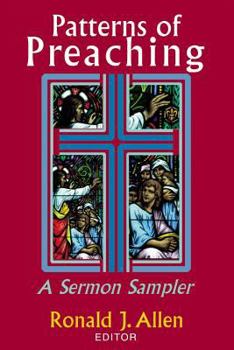Patterns of Preaching: A Sermon Sampler
Select Format
Select Condition 
Book Overview
This collection of sermons by noted homileticians illustrates thirty-four distinct styles of contemporary and traditional preaching. This description may be from another edition of this product.
Format:Paperback
Language:English
ISBN:0827229534
ISBN13:9780827229532
Release Date:June 1998
Publisher:Christian Board of Publication
Length:264 Pages
Weight:0.95 lbs.
Dimensions:0.7" x 6.0" x 9.1"
Customer Reviews
2 ratings
A tapestry of sermons
Published by Thriftbooks.com User , 21 years ago
`Patterns of Preaching' is yet another useful text from Ron Allen, professor of New Testament and Preaching at my seminary. This text is a collection sermons with commentary, showing overall the primary point that there is no single `right' way to preach. There are preachers past and present who develop a certain style, and others who advocate the importance of certain methods, but what Allen has done in this text is show that the most important thing, beyond style, beyond method, beyond all else, is to preach a meaningful message that is faithful to the gospel.This book is intended as a companion piece to Allen's text `Interpreting the Gospel: An Introduction to Preaching'. Taken as a set, these give a thorough introduction to preaching, with theory, theology, and practical examples. `Patterns of Preaching' has 34 different models of sermons given as examples (who knew there were so many varieties?) from classical and contemporary styles. Each sermon has commentary that includes the context of the congregation and occasion, since sermons often fail to make sense outside of their contexts.The first main section of the book looks at traditional patterns of preaching. These include the Puritan plain style, preaching verse by verse, inductive preaching, and preaching to make a point. Included in these sermons are essays and examples by noted preachers such as Susan Bond, Joseph Jeter, Henry Mitchell and Fred Craddock. Many sermons preached today still rely on these models that go back generations, if not centuries.The second section looks at more contemporary patterns for preaching. These include setting the sermon as a series of plots and moves (Buttrick style), sermons involving critical reflection and naivetes, sermons that draw from the arts, and sermons that follow the same idea as a novel would be developed. Preachers here include Paul Scott Wilson, Barbara Lundblad, Jana Childers, and David Buttrick.The third section looks at patterns by subject - here the reader will find examples of wedding sermons, funeral sermons, preaching on biblical themes, doctrinal themes, social issues, or even personal issues. Also included here is an example of a teaching sermon (while all sermons to a certain extent involve teaching, there are some times in the life of congregations a certain lesson needs to be made more explicit).The final section looks at theological topics in preaching. Here are five examples done in the evangelical, liberation, post-liberal, revisionist and postmodern theological styles. The intention here is to show how preaching can remain faithful to the gospel message and be adapted to different theological paradigms.In his introduction, Allen argues that most sermons fall into one of four broad categories: Expository-deductiveExpository-inductiveTopical-deductiveTopical-inductiveIn expository preaching, the sermon's intention is to help the congregation understand its situation through a biblical passage or theme. In the t
escape the one style preaching rut
Published by Thriftbooks.com User , 24 years ago
This book divides neatly into classical styles of preaching and contemporary styles of preaching. Each chapter gives a description of the style of preaching being analyzed and how it works and then includes a sample sermon of that style. I found this to be very helpful in challenging my thinking about "the" right way to preach and it gave me multiple styles to consider as I try to reach a world that seems less and less interested in the way we have traditionally packaged our messages. One style may "fit" a particular circumstance or audience or passage better than another style and therefore make us better equipped to apply the Word. It also would help us preachers be less predictable with those who regularly listen to us.





